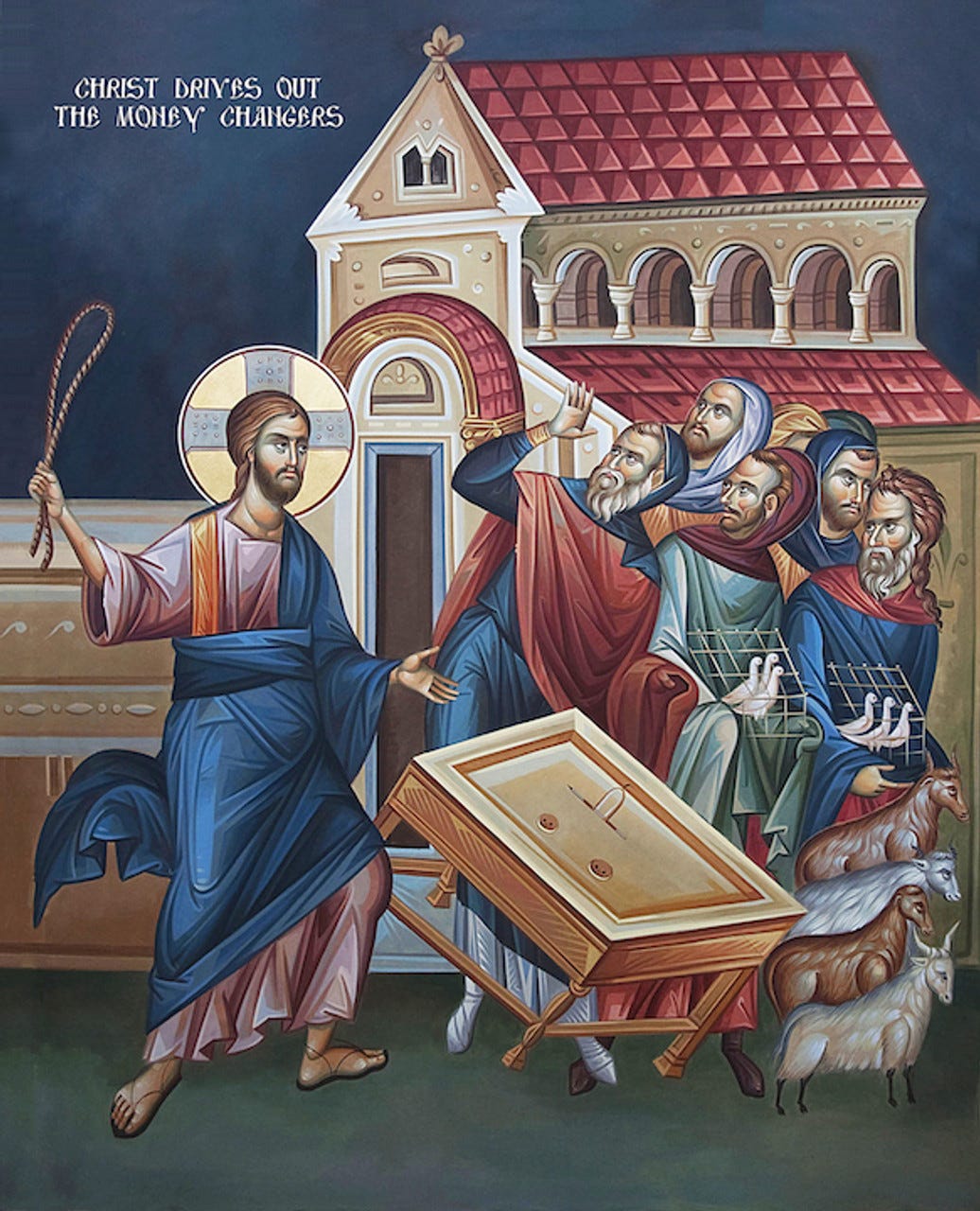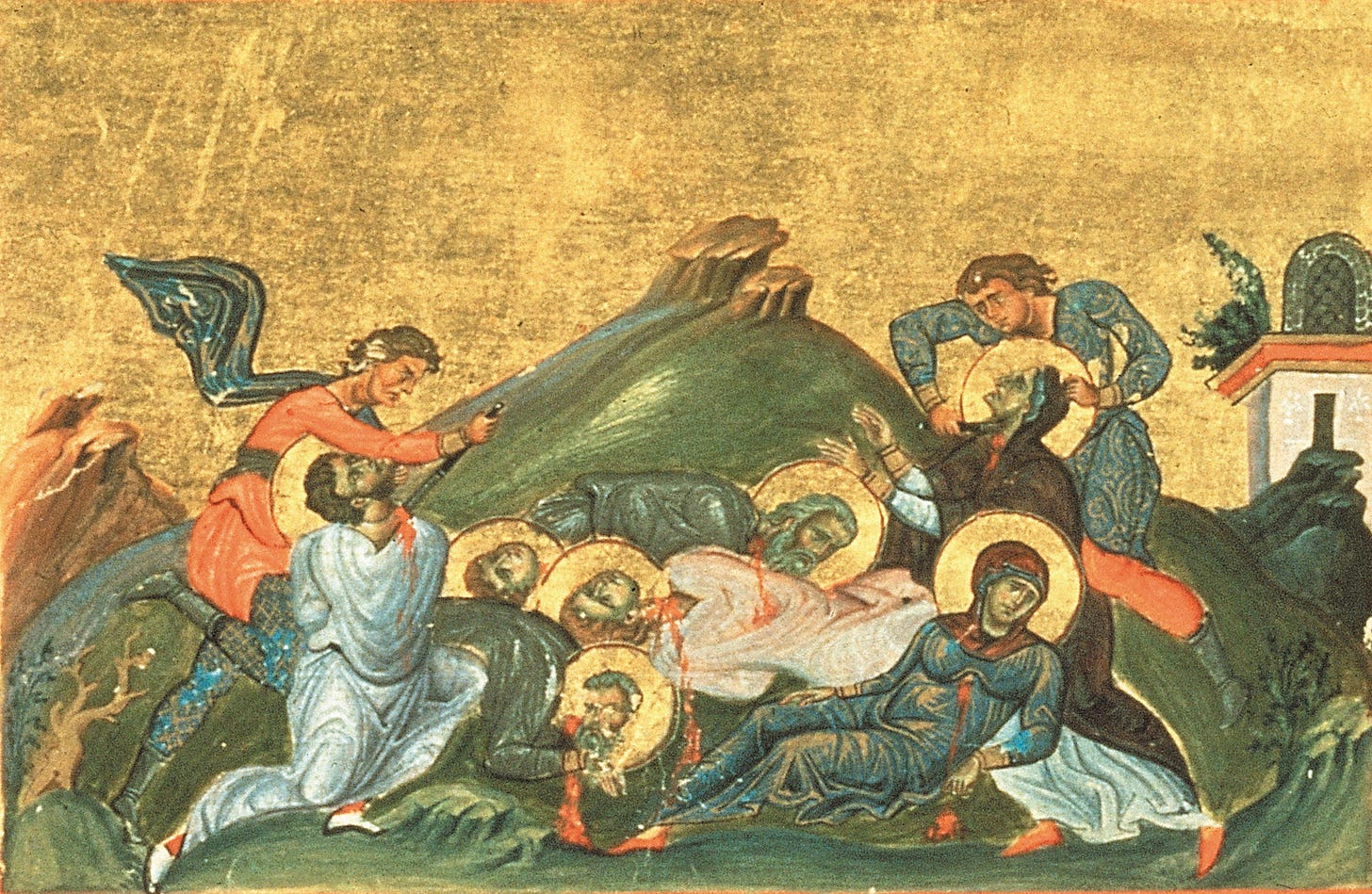Bartering with the World
To Drive out Vice with a Zealous Love
The zeal of thy house hath eaten me up.
-John 2:17, Douay-Rheims translation
Already we have come to the third week of Lent. There are not many feast days during these weeks, and it lends our minds liturgically to a more intense focus on Christ.
This week, we’ll discuss the great interior work to be accomplished in this season of penance through the lens of the readings for the Third Sunday of Lent.

Zealous
In the Gospel for the Third Sunday of Lent we hear the passage which reads, “Zeal for your house will consume me.” There are two other striking and helpful translations of this verse to consider.
The first is the Douay-Rheims: The zeal of thy house hath eaten me up.
The second is a translation from an English priest, Monsignor Ronald Knox. During his 13 years at Oxford as a chaplain, he translated his own version of the Latin vulgate bible.
Knox translates it: I am consumed with jealousy for the honour of thy house.
To think of being eaten up by an intense love for the House of the Lord easily appreciated, but jealousy is tougher to consider. We can think of it poetically, and draw on a kind of allegorical jealousy. But is the Lord asking us for something greater? Is it simply a nice thought?
What are these interchanged words? Let’s put the words next to each other:
Jealous and Zealous. Funny how the only difference is one letter - the first. As it turns out, that’s not a coincidence.
Zealous (adj): The sense "fervent, inspired" was earlier in English in jealous (late 14c.), which is the same word but come up through French.
Jealous (adj): In biblical language (early 13c.) "tolerating no unfaithfulness."1
We are starting to get a clearer picture for Christ in the Gospel, for the “jealous” God of the Old Testament that we are told of in the Sunday lectionary:
So he made a kind of whip out of cords, and drove them all, with their sheep and oxen, out of the temple, spilling the bankers’ coins and overthrowing their tables… And his disciples remembered how it is written, I am consumed with jealousy for the honour of thy house.2
and
“For I, the LORD, your God, am a jealous God,
inflicting punishment for their fathers’ wickedness
on the children of those who hate me3
There is no lack of intensity in these scriptures. But the readings this week tell us everything about what we are striving towards this Lent. We are reminded of the purging work God Himself is accomplishing in us.
How can he prepare us to be able to receive an everlasting love?
The Violent Purge of Vice
Take these away, do not turn my Father’s house into a place of barter.4
We admit freely the excellence of Christ driving out wickedness from the Temple in this violently brilliant way. But do we see it so graciously when he drives that same malice from our hearts?
We are those who have turned the Lord’s own temple into a market place, his temple of our souls and our bodies. We are most sacred persons whom the Lord purchased for himself by his crucifixion — with his very life.
Yet, we sell the treasure of ourselves for the profits of this world, of this lifetime.
Why do we make our own selves into bartered goods? He made us, redeemed us, to serve him with our whole mind, soul, body, heart, strength. But we give ourselves up to corruption.
Justice, Temperance, Fortitude, Prudence, Wisdom, Knowledge, Understanding, Piety, Fear of the Lord. Faith and Hope — why do we sell these for Hatred, Sloth, Envy, Discord, Contention, Strife, Scandal, Folly, Negligence, Murder, Injury, Theft, Backbiting, Derision, Cursing, Timidity, Vanity, Presumption, Ambition, Gluttony, Drunkenness, Lust, Cruelty.
The fasting, prayer, and almsgiving of Lent teaches us once more to deny the pleasures of this world and spend ourselves in the service of the Kingdom of God.
We must let him drive out the money changers from within.
Lord, if it be thy will, thou hast power to make me clean.5
The Law Gives Life
One of the first ways we can allow Christ to drive away sin is by acknowledging the laws of the Lord and repenting of having broken his commandments.
The first reading of the Sunday liturgy is a passage from Exodus
but bestowing mercy down to the thousandth generation
on the children of those who love me and keep my commandments.6
Catholics are well known for having a religion of rules, and it is a true perception. We have Laws, given by God himself.
The Psalmist tell us:
“The law of the LORD is perfect,
refreshing the soul;
The decree of the LORD is trustworthy,
giving wisdom to the simple.They are more precious than gold,
than a heap of purest gold;
sweeter also than syrup
or honey from the comb.”7
Still, here we are, like the money changers — exchanging the law of the Lord for “gold.” We think because we do not live so elaborately as the famous and the wealthy that we do not abuse his creation and his justice. We think because we can point to those more apparently vicious, that we surely have nothing to surrender.
Let us never forget the profound image of the young man who comes before Christ in the Bible, and swears he has followed every commandment to the utmost degree:
If thou hast a mind to enter into life, keep the commandments.
I have kept all these, the young man told him, ever since I grew up; where is it that I am still wanting?
Jesus said to him, If thou hast a mind to be perfect, go home and sell all that belongs to thee; give it to the poor, and so the treasure thou hast shall be in heaven; then come back and follow me.
When he heard this, the young man went away sad at heart, for he had great possessions.
And Jesus said to his disciples, Believe me, a rich man will not enter God’s kingdom easily.8
This is one of the most famous Gospel passages, and for good reason. It exhibits all the power of the New Law. That Christ does not demolish the law, but intends to make it perfect in our hearts. And we cannot have the law made perfect if we are pursuing the goods of this life at the expense of neighbor, of truth and love. If we are not ready to lose it all in an instant for Christ.
At hearing this, the disciples were thrown into great bewilderment; Why then, they asked, who can be saved? Jesus fastened his eyes on them, and said to them, Such a thing is impossible to man’s powers, but to God all things are possible.9
This echoes perfectly the second reading from the liturgy:
For the foolishness of God is wiser than human wisdom,
and the weakness of God is stronger than human strength.10
Why are we so reticent in believing in the wisdom of God? Why do we hesitate to trust Him when he says our sin will lead to nothing but unhappiness? He died for us that we would learn to believe in His love. Let us learn.
He Will Rebuild
It is no wonder so many stood in awe at the teachings of Christ — at His commands.
“Destroy this temple and in three days I will raise it up.”
The Jews said,
“This temple has been under construction for forty-six years,
and you will raise it up in three days?”11
This skepticism towards Christ is our skepticism. Were we to destroy our false idols, our empty worships, the entirety of a sinful life — what would remain? Were we to let go of a lifetime of sin, could he truly rebuild a life for us — in mere days? These are familiar questions raised in letting go of disordered relationships, attachments, addictions. We are so scared of what will be left if we cut out the sin.
There is but one way to find out what glories await us. It is hard to hope, for we don’t always quite know what there is to hope for. But we often do know how to worry about everything that we will lose, or could lose.
This Lent, may we commit ourselves more resolutely than ever to believing in the promises of Jesus. He comes not to punish, but to make beautiful — more beautiful than we could ever hope for.
God so loved the world, that he gave up his only-begotten Son, so that those who believe in him may not perish, but have eternal life.12
Saints of the Week
March 4 — St. Casimir of Poland
March 7 — Sts. Perpetua and Felicity
March 8 — St. John of God
“And when I see so many of my brethren in poverty, and my neighbours suffering beyond their strength, and oppressed in mind or body by so many cares, and am unable to help them, it causes me exceeding sorrow. But I trust in Christ who knows my heart. Then I say, ‘Accursed is the man who puts his trust in men, and not in Christ alone.’ You will be separated from men, whether you like it or not. But Christ is faithful and is with us always, and he provides all things. We are right to give him thanks. Amen."
March 9 — St. Frances of Rome
Inspiration for the Week
Rebel in the Ranks — Prof. Brad Gregory of Notre Dame
Lent is a good time to learn more about what happened in the Reformation and where Luther went astray from the Church. It is a time to consider what we lose if we do away with penance and almsgiving, yet his critiques help us to be more precise about what it is we’re aiming for in these essential parts of the Christian life.
One of the best known works of Pope Benedict is his Jesus of Nazareth series, and this book from Palm Sunday to Easter is perfect reading for the end of Lent to meditate on Christ in the Scriptures.
A Lenten Album for Sin and Repentance — Sigh No More — Mumford and Sons
This is an old album, but it’s evergreen. It touches on so many elements of sin and redemption, and makes for a perfect playlist during Lent.
How to Make a Good Examination of Conscience for your Lenten Confession
John 2:15, 17
Exodus 20:5
John 2:16
Matthew 8:2
Exodus 20:6
Psalm 19: 8, 11
Mathew 19: 17, 20, 21-23
Matthew 19:25-26
1 Corinthians 1:25
John 2:19-20
John 3:16






